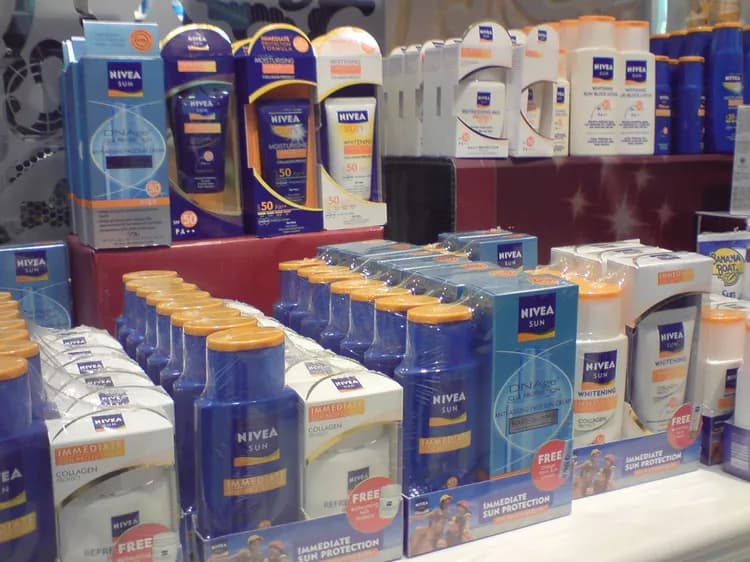Sunscreen is a type of lotion, spray, gel, or other topical product that absorbs or reflects some of the sun's ultraviolet (UV) radiation on the skin exposed to sunlight in order to help protect the skin from sunburn. Sunscreen is important to protect the skin from aging and various cancers such as melanoma.
Melanoma is a type of skin cancer that forms from pigment-containing cells in the skin called melanocytes. It is less common than other forms of skin cancer; however, melanoma is much more aggressive than other cancers, especially when not diagnosed and treated during the early stages. It accounts for 75% of skin cancer-related deaths.
Ultraviolet B (UVB) light from the sun is absorbed by skin cell DNA and results in direct DNA damage. Ultraviolet A (UVA) light (longer wavelengths than UVB) from the sun or tanning beds can also be directly absorbed by skin DNA, but at a lower effectiveness than UVB light.
A consistent use of sunscreens can protect the skin from these ultraviolet rays, with the potential to slow or temporarily prevent the development of wrinkles and sagging skin. There are specific, recommended ways to apply sunscreen in order to maximize the effectiveness of sun protection.
First, one should look for a sunscreen that contains SPF (Sun Protecting Factor) 15 or higher. Anyone over the age of six months and older should apply one ounce of sunscreen daily, every two hours. It should be applied 30 minutes before sun exposure to be given the opportunity to bind to the skin. Children under the age of six months should not be exposed to the sun because their skin is extremely sensitive to the sun’s rays. Even if the work is being performed indoors and/or if it is a cloudy day, sunscreen should be applied. Up to 40% of the sun’s UV radiation reaches the surface of the earth on an entirely cloudy day.
The expiration dates on the sunscreen labels do matter. If the same bottle of sunscreen is being used for several years in a row, then it is likely that the sunscreen may have no protective effect. In addition, open bottles of sunscreen are prone to contamination.
We do need sunlight for our bodies to produce vitamin D; however, an overexposure does not give our body additional vitamin D. Most individuals can achieve their vitamin D requirements of 600 IU or 15 micrograms per day, through normal daily outdoor activities that amounts to anywhere between 5-30 minutes, twice per week. Some do not like the greasy feeling of sunscreen. In such cases, it is advisable to wear protective clothing as sun protection. The more covered up one is, the less sunscreen is needed to protect against the sun. A proper application of sunscreen is vital to skin health, as it can help protect against skin cancer, particularly melanoma.
Additional Resources:
Green, A., Williams, G., Nèale, R., Hart, V., Leslie, D., Parsons, P., ... & Russell, A. (1999). Daily sunscreen application and betacarotene supplementation in prevention of basal-cell and squamous-cell carcinomas of the skin: a randomised controlled trial. The Lancet, 354(9180), 723-729.
Jerant, A. F., Johnson, J. T., Sheridan, C. D., & Caffrey, T. J. (2000). Early detection and treatment of skin cancer. American family physician, 62(2), 357-68.
Mccullough, J. L., & Kelly, K. M. (2006). Prevention and treatment of skin aging. Annals of the New York Academy of Sciences, 1067(1), 323-331.
Rünger, T. M., Farahvash, B., Hatvani, Z., & Rees, A. (2012). Comparison of DNA damage responses following equimutagenic doses of UVA and UVB: a less effective cell cycle arrest with UVA may render UVA-induced pyrimidine dimers more mutagenic than UVB-induced ones. Photochemical & Photobiological Sciences, 11(1), 207-215.
U.S. Food and Drug Administration. (n.d.). Retrieved December 2, 2014, from http://www.fda.gov/drugs/resourcesforyou/consumers/buyingusingmedicinesafely/understandingover-the-countermedicines/ucm239463.htm
Helpful Peer-Reviewed Medical Articles:
Geller, A. C., Colditz, G., Oliveria, S., Emmons, K., Jorgensen, C., Aweh, G. N., & Frazier, A. L. (2002). Use of sunscreen, sunburning rates, and tanning bed use among more than 10 000 US children and adolescents.Pediatrics, 109(6), 1009-1014.
Green, A. C., Williams, G. M., Logan, V., & Strutton, G. M. (2011). Reduced melanoma after regular sunscreen use: randomized trial follow-up. Journal of Clinical Oncology, 29(3), 257-263.
van der Pols, J. C., Williams, G. M., Pandeya, N., Logan, V., & Green, A. C. (2006). Prolonged prevention of squamous cell carcinoma of the skin by regular sunscreen use. Cancer Epidemiology Biomarkers & Prevention,15(12), 2546-2548.
Dennis, L. K., Freeman, L. E. B., & VanBeek, M. J. (2003). Sunscreen use and the risk for melanoma: a quantitative review. Annals of internal medicine, 139(12), 966-978.
Armstrong, A. W., Watson, A. J., Makredes, M., Frangos, J. E., Kimball, A. B., & Kvedar, J. C. (2009). Text-message reminders to improve sunscreen use: a randomized, controlled trial using electronic monitoring. Archives of dermatology, 145(11), 1230-1236.
Autier, P., Dore, J. F., Reis, A. C., Grivegnee, A., Ollivaud, L., Truchetet, F., ... & Cesarini, J. P. (2000). Sunscreen use and intentional exposure to ultraviolet A and B radiation: a double blind randomized trial using personal dosimeters. British journal of cancer, 83(9), 1243.
Autier, P., Boniol, M., & Doré, J. F. (2007). Sunscreen use and increased duration of intentional sun exposure: still a burning issue. International Journal of Cancer, 121(1), 1-5.
Related Articles
Test Your Knowledge
Asked by users
Related Centers
Related Specialties
Related Physicians
Related Procedures
Related Resources
Join DoveHubs
and connect with fellow professionals


0 Comments
Please log in to post a comment.